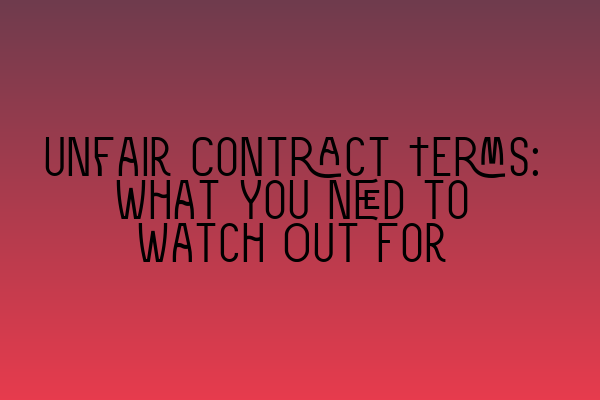Unfair Contract Terms: What You Need to Watch Out For
Welcome to our blog at SQE Contract Law! In this article, we will be diving deep into the world of contract law, specifically focusing on unfair contract terms. Contracts are an integral part of business dealings, but it’s important to be aware of certain terms that may put you at a disadvantage.
Before we proceed, it’s worth mentioning that understanding the impact of contract terms is essential for protecting your rights and ensuring fair treatment in business transactions. In this article, we will explore the concept of unfair contract terms, common pitfalls to watch out for, and steps you can take to safeguard your interests.
The Basics of Unfair Contract Terms
Unfair contract terms refer to clauses or conditions within a contract that give one party an unfair advantage over the other. These terms may be hidden, unclear, or written in complicated language that makes it difficult for individuals to fully comprehend the implications.
One common example of unfair contract terms is the inclusion of excessive charges or penalties. For instance, a service provider may include a clause that allows them to charge exorbitant fees for early termination of a contract. Such terms could potentially put the other party at a significant financial disadvantage.
It is important to note that unfair contract terms are subject to legal scrutiny. Courts have the authority to declare such clauses unenforceable and provide remedies to the disadvantaged party.
Common Unfair Contract Terms
When entering into a contract, it is crucial to be vigilant and identify any potentially unfair terms. Here are some common examples:
- Exclusion clauses that absolve one party from liability, even in cases of negligence
- Terms that limit the amount of compensation payable in case of breach
- Automatic renewal clauses that bind parties to extended contract periods without their explicit consent
- Hidden fees and charges that are not adequately disclosed
- Terms that allow one party to unilaterally modify or terminate the contract without sufficient notice
It’s important to carefully review any contract before signing and seek legal advice if necessary. Understanding the potential risks associated with unfair contract terms can help you negotiate better terms or even walk away from a questionable agreement.
Protecting Your Interests
There are several steps you can take to protect your interests and minimize the risk of unfair contract terms:
- Read the contract carefully and seek legal advice if you are unsure about any terms or provisions.
- Negotiate the terms to ensure they are fair and reasonable for both parties.
- Ensure that all terms are clearly written and easily understood by all parties involved.
- Consider including a clause that allows for contract review and amendment if circumstances change.
- Keep detailed records of any communications, negotiations, and changes to the contract.
By following these steps, you can significantly reduce the risk of unfair contract terms and protect your rights as a party to an agreement.
Conclusion
In conclusion, understanding unfair contract terms is crucial for safeguarding your interests in business transactions. By being vigilant, carefully reviewing contracts, seeking legal advice when necessary, and negotiating fair terms, you can protect yourself from potential disadvantages.
If you’re interested in learning more about contract law and related topics, be sure to check out our other articles:
- Exploring the Impact of Frustration on Contractual Obligations: Legal Insights
- Interpreting Contractual Clauses: Unlocking the Hidden Meanings
- Legal Aspects of Business Contracts: Key Considerations for Entrepreneurs
- SQE Contract Law vs. Traditional Qualifications: A Comparative Analysis
- Agreements in Contract Law: Understanding Its Various Types
Thanks for reading and feel free to reach out to us at SQE Contract Law if you have any questions or need further assistance!
